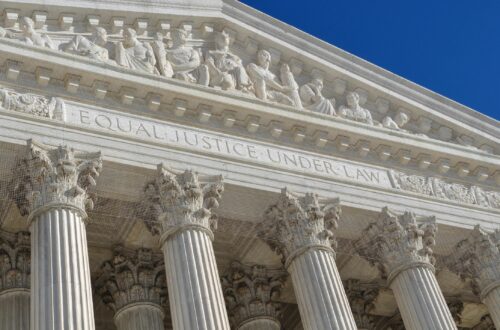Christians are allowed to hold Christian beliefs. But it is wrong for Christians to impose those beliefs on other people.
Presumably, the beliefs in question are those beliefs that lead to laws of countries. Such beliefs might include: it is morally wrong to take the life of a child in the womb, marriage is the life-long bond between one man and one woman, and one’s gender is determined by one’s chromosomes and genitalia and not by social construction. In turn, those beliefs have some ground in a specifically religious commitment. For example, Christians believe it is wrong to kill a child inside the womb because the child is a human being made in the image of God and God commands that we not kill them.
By ‘imposing beliefs’ what is usually meant is that beliefs about what is morally right or wrong become the basis for a law of a country that prohibits some action or other. For example, a Christian might support the overturning of the Supreme Court’s ruling on Roe vs. Wade and wish to impose a blanket ban on all abortions through the writing and enforcing of legislation.
Christians believe many things. Some things we believe are doctrinal. We believe that Jesus is the Son of God, the second person of the Trinity, the Messiah. We believe that God created the heavens and the earth and providentially controls all that happens in history. We believe that God is righteousness, without sin, and has revealed his moral law to human beings in creation and in his word, the Bible. Most American Christians do not want laws passed that enshrine those doctrines as the official beliefs of the country. In fact, it was Christians who argued strongly against the establishment of any particular Christian creed in American law.
There are other beliefs about human life lived in God’s world. Those beliefs include the nature of human beings having intrinsic value in virtue of having been made in the image of God, the belief that all human beings are subject to the fall and in virtue of which have a propensity to desire and carry out immoral actions against which families, churches and governments should act. Mothers and Fathers are responsible for discipline in the home, churches are responsible for the discipline of their members, and governments are responsible for the restraint of evil in the wider society.
Just what Christians think is the government’s responsibility is not universally agreed upon among Christians. For example, some Christians think that governments should not have anything to do with marriage. Instead of allowing no-fault divorces, homosexual marriage or polygamy, the government should just remove marriage legislation from the role of government. Others think that marriage is a civic institution established by God for the common good, the raising of children and as a reflection of the intimate union of the love between the members of the Trinity. Consequently, marriage laws should reflect God’s view of familial relationships. Others think there is room for both civic marriage laws and church marriage covenants and they don’t have to be the same.
So, Christians don’t think all their beliefs should be imposed by laws of countries. Nor do they agree on which beliefs should be reflected in legislation. There are many actions that Christians think are wrong but have no desire to see a law of the country against it. We think cheating on an exam, lying to a friend, being arrogant, having a lustful thought, and loving money more than God are all immoral but don’t think they ought to be on the agenda in congress. It is not even clear that gender self-identification is something Christians want to see legislation against. I don’t think I’ve heard of any Christian saying that the law of the land should restrict people’s desire to dress in clothes usually worn by the opposite sex. Some Christians might think there is something wrong with doing so, but most do not want a law against it. (Of course, Christians have mostly objected to laws forcing schools to allow boys in girls locker rooms). Of all the beliefs mentioned above only one has wide agreement – abortion. Many Christians (and a growing number of non-Christians) believe that abortion is immoral and wish to see government legislation that would restrict it. Christians thought this about slavery, segregation, eugenics, illegitimate Kings. They voted, argued and even fought in order to impose their view. They think it now about sex trafficking, abortion, euthanasia, and many other issues. Those who are Christians believe and act this way for largely Christian reasons.
 |
| William Wilberforce, a Christian who imposed Christian beliefs on others. |
So, the retorter certainly thinks that some Christians do want to impose at least some of their beliefs on others. And this, says he, is wrong, immoral. If so, then Christians need a response. What should we say? How a Christian might respond depends on what the retorter means by his retort. What exactly is the Christian doing wrong when she imposes her view on others?
I’m going to charitably presume what the retorter does not mean: The retorter can’t mean that it is wrong to impose some peoples’ moral rules on other people. If that’s what is meant, then the view would entail that there should be no legal restrictions for any behavior whatsoever. Rape, murder, theft, and all the other horrible things you can think of are all things that some people want to do from time to time and other people think should be legislated against. Furthermore, the belief that it is morally wrong to impose some peoples’ moral rules on other people is a moral rule and, on this view, is itself wrong to impose on other people. I’m going to assume the retorter doesn’t mean no one should impose their beliefs on other people.
So what does the retorter mean? Perhaps he means that there are kinds of beliefs that should be ignored and other kinds that should be accepted. On this interpretation, it may be argued that all beliefs apart from religious beliefs can be imposed on other people. However, it is not clear that all the beliefs in question are necessarily religious. If they aren’t, then they can’t be excluded on that basis. Recall some candidates from the previous paragraph:
It is morally wrong to take the life of a child in the womb, marriage is the life-long bond between one man and one woman, and one’s gender is determined by one’s chromosomes and genitalia and not by social construction.
“Democracy demands that the religiously motivated translate their concerns into universal, rather than religion-specific, values. It requires that their proposals be subject to argument and amenable to reason.” (Barak Obama, “Call to Renewal” 2006)
There is something right about this worry. Under a series of popes the Roman See persecuted Jews and non-believers if their beliefs fell outside the church’s dogmatic bounds. The retorter might think that that is what Christians want – Jail time for non-believers, forced exile for militant atheists and alike. Or, perhaps even lighter coercion would do the trick. What if taxation was lighter for those in agreement or certain institutions were made inaccessible to those with certain forbidden beliefs? Indeed, some people like Richard Dawkins argue that Christians are already engaged in a form of imposition. We teach our children about God and the Bible and train them up to believe that certain actions are wrong in virtue of the fact that those actions displease God. The retorter may have mind that teaching our religious beliefs to our children is immoral because they do not have a chance to learn the alternative.
Christians are not on whole forcing anyone to agree with them. We have one coercive threat–perhaps the ultimate threat–that of eternity separated from God unless you cast yourself at the mercy of Christ. It is hard to see this as coercion if you don’t believe in hell or God. Of course, I think you should believe in those things (for good reasons), but I don’t believe in my ability to force you to believe those things. The threat of not baking a cake for you seems to be pretty insignificant compared to the daily public shaming Christians get in some of the media and among many on the political left.
I have looked at three candidates for interpreting the retorter’s retort. The first view–that it is wrong to impose some peoples’ beliefs on others–is self-defeating and entails there being no laws of a country. The second view, that only religious beliefs are immoral to impose on others, fails to capture the kinds of beliefs the retorter wants to prevent being imposed since none of the candidate beliefs are exclusively religious beliefs. There is no good reason for the third view, that religious reasons are inadmissible in public debate about what moral laws we should have. The final interpretation–that the retorter fears that Christians will establish an inquisition that coerces beliefs through threat–has some historical precedent. It is not a view common among American protestants. It is widely held by American protestants that we are free to believe in accord with our conscience without interference from the state. Conversely, the most vigorous public coercion is being carried out by some non-religious people against religious people threatening livelihoods and entrance into institutions.
In conclusion, the retort has very little force once we consider what it might mean. What is much more crucial is what beliefs are true. If it really is a grievous evil to kill the unborn, then we should impose that view on others. The debate should not be about whether it is wrong to impose the view; it should be about the view itself.


